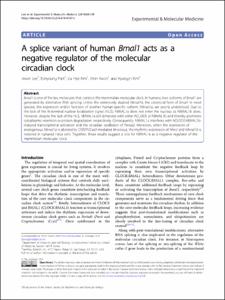A splice variant of human Bmal1 acts as a negative regulator of the molecular circadian clock
- Title
- A splice variant of human Bmal1 acts as a negative regulator of the molecular circadian clock
- Author(s)
- Lee, Jiwon ; Park, Eonyoung ; Kim, Ga Hye ; Kwon, Ilmin ; Kim, Kyungjin
- Issued Date
- 2018-12
- Citation
- Experimental and Molecular Medicine, v.50, no.12, pp.159 - 10
- Type
- Article
- Keywords
- TRANSCRIPTION FACTOR ; PROTEIN ; TEMPERATURE ; EXPRESSION ; CELLS ; PHOSPHORYLATION ; VISUALIZATION ; DEGRADATION ; ACTIVATION ; MECHANISMS
- ISSN
- 1226-3613
- Abstract
- Bmal1 is one of the key molecules that controls the mammalian molecular clock. In humans, two isoforms of Bmal1 are generated by alternative RNA splicing. Unlike the extensively studied hBmal1b, the canonical form of Bmal1 in most species, the expression and/or function of another human-specific isoform, hBmal1a, are poorly understood. Due to the lack of the N-terminal nuclear localization signal (NLS), hBMAL1a does not enter the nucleus as hBMAL1b does. However, despite the lack of the NLS, hBMAL1a still dimerizes with either hCLOCK or hBMAL1b and thereby promotes cytoplasmic retention or protein degradation, respectively. Consequently, hBMAL1a interferes with hCLOCK: hBMAL1-binduced transcriptional activation and the circadian oscillation of Period2. Moreover, when the expression of endogenous hBmal1a is aborted by CRISPR/Cas9-mediated knockout, the rhythmic expression of hPer2 and hBmal1b is restored in cultured HeLa cells. Together, these results suggest a role for hBMAL1a as a negative regulator of the mammalian molecular clock. © The Author(s) 2018
- Publisher
- 생화학분자생물학회
- Files in This Item:
-
 기타 데이터 / 2.35 MB / Adobe PDF
download
기타 데이터 / 2.35 MB / Adobe PDF
download
- Appears in Collections:
- ETC 1. Journal Articles



